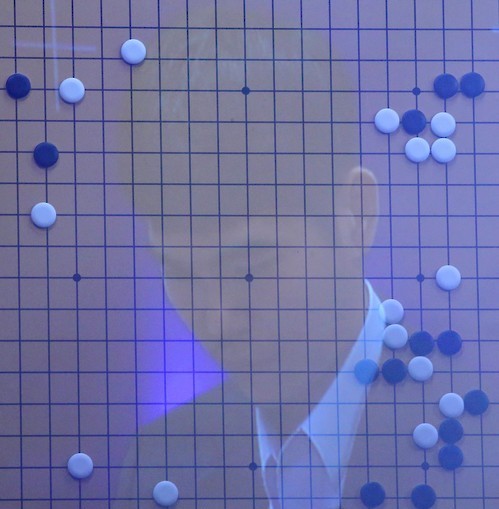- California Assembly OKs highest minimum wage in nation
- S. Korea unveils first graphic cigarette warnings
- US joins with South Korea, Japan in bid to deter North Korea
- LPGA golfer Chun In-gee finally back in action
- S. Korea won’t be top seed in final World Cup qualification round
- US men’s soccer misses 2nd straight Olympics
- US back on track in qualifying with 4-0 win over Guatemala
- High-intensity workout injuries spawn cottage industry
- CDC expands range of Zika mosquitoes into parts of Northeast
- Who knew? ‘The Walking Dead’ is helping families connect
Google A.I. beats S. Korean Go master to close the series 4-1

At the fifth man-versus-computer showdown in Seoul, AlphaGo, the AI designed by Google’s London-based firm DeepMind, edged out Lee with a win by resignation in 280 moves after playing five hours. (Yonhap)
By Joo Kyung-don
SEOUL (Yonhap) — There was no mercy from the machine.
Google’s artificial intelligence (AI) program AlphaGo beat South Korean Go champ Lee Se-dol in their final Go match on Tuesday, taking the five-round Go tournament with a score of 4-1.
At the fifth man-versus-computer showdown in Seoul, AlphaGo, the AI designed by Google’s London-based firm DeepMind, edged out Lee with a win by resignation in 280 moves after playing five hours.
The self-learning program already clinched the series win at the special Go tournament named Google DeepMind Challenge Match after winning three straight games last week before Lee struck back with a victory on Sunday. Google said that the tournament prize money of US$1 million will be donated to UNICEF and other charities.
Lee, 33, is a ninth-dan player who went pro at the age of 12 and has won 18 international trophies. AlphaGo first made headlines last October after beating European champion Fan Hui, a second-dan player, in five consecutive matches.
Go, known as “baduk” in Korea, originated in China more than 2,500 years ago. It involves two players alternately putting black and white stones on a checkerboard-like grid of 19 lines by 19 lines. The object is to claim larger territories than one’s opponent by surrounding vacant areas of the board using one’s own stones.
Go has been viewed as one of the hardest games for computers to master. Google said the possible number of board configurations for Go is larger than the number of atoms in the universe.
Just like he promised on Sunday, Lee picked up black stones, which doesn’t get “komi” or compensation points of 7.5 under the Chinese rule, and initiated his game by occupying a 3-4 point in the top right corner.
AlphaGo, whose moves are actually placed on the board by Google DeepMind programmer and amateur 6-dan Go player Aja Huang, went for its usual move taking the “flower points” or 4-4 point in the top left corner.
Their fight broke out in the bottom right corner, which Lee managed to save some points against AlphaGo’s white stones. The engagement then started in the left top corner and the sequence moved on to the top right corner in which Lee’s effort to reduce the white’s influence. But this also allowed AlphaGo to get territories in the center.
But coming off from concern of getting swept by the machine, Lee showed his usual style of direct play, going center to ruin the AlphaGo’s presumed territories in the center and bottom left corner.
AlphaGo, which displayed a couple of “suicidal” moves on Sunday, also showed some strange moves in the middle of the game and consumed more time than it did in the last four matches, boosting hopes for humans of getting another victory.
While uncertainties rose in the center of the board, Lee used his allotted two-hour time after the game was played for 3 hours and 40 minutes. At that moment, AlphaGo had about 20 minutes left.
The AI also entered 60-second overtime use in the end of the game, but AlphaGo’s cold calculation of territories closed the match in its favor.
“AlphaGo really plays well in the closing phase of the game,” said Yoo Chang-hyuk, a ninth-dan player who was commentating the match. “In order to beat AlphaGo, humans need to plays their best game from the beginning to the end.”
















Thomas Luff
October 12, 2017 at 6:16 AM
Sanctuary Outreach has called the shots to merger with Sir Winston Churchill High School. Their technology research center is based on the Korean developments and it’s child’s play. Anyway, under such circumstances, they will do your essay on Anthropology and Women and gender studies.